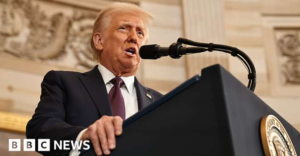Federal Employees in DEI Roles to Transition to Paid Leave Under Trump Administration
In a significant move by the Trump administration, all federal employees holding Diversity, Equity, and Inclusion (DEI) positions have been instructed to transition to paid leave effective immediately. This decision has sparked widespread discussion, with advocates and critics alike weighing in on its implications for the federal workforce and DEI initiatives across the government.
The administration has emphasized its focus on streamlining government operations, often citing a need to evaluate programs and roles to ensure efficiency. The decision to place DEI employees on paid leave could indicate a review of the effectiveness and necessity of these roles within federal agencies. However, many are concerned about the message this sends regarding the government’s commitment to fostering equitable and inclusive workplaces.
Supporters of the move argue that it provides an opportunity to reassess DEI initiatives that, in their view, may have become overly bureaucratic or ideologically driven. They see this as a chance to realign priorities and focus resources on areas deemed more directly beneficial to the American public. On the other hand, critics contend that sidelining DEI roles undermines years of progress toward creating a more diverse and inclusive federal workforce.
Advocates for DEI programs stress their importance in addressing systemic barriers and promoting equal opportunities in federal employment. They worry that this decision could hinder ongoing efforts to build a government that reflects the diversity of the nation it serves. Furthermore, the sudden nature of the change has raised questions about the future of DEI initiatives and the employees dedicated to them.
As the federal workforce adjusts to this development, the move continues to fuel debates about the role of diversity and inclusion within public institutions. Whether this marks a temporary reassessment or a broader policy shift remains to be seen, but its impact will likely be felt across government agencies and beyond.
beyond.